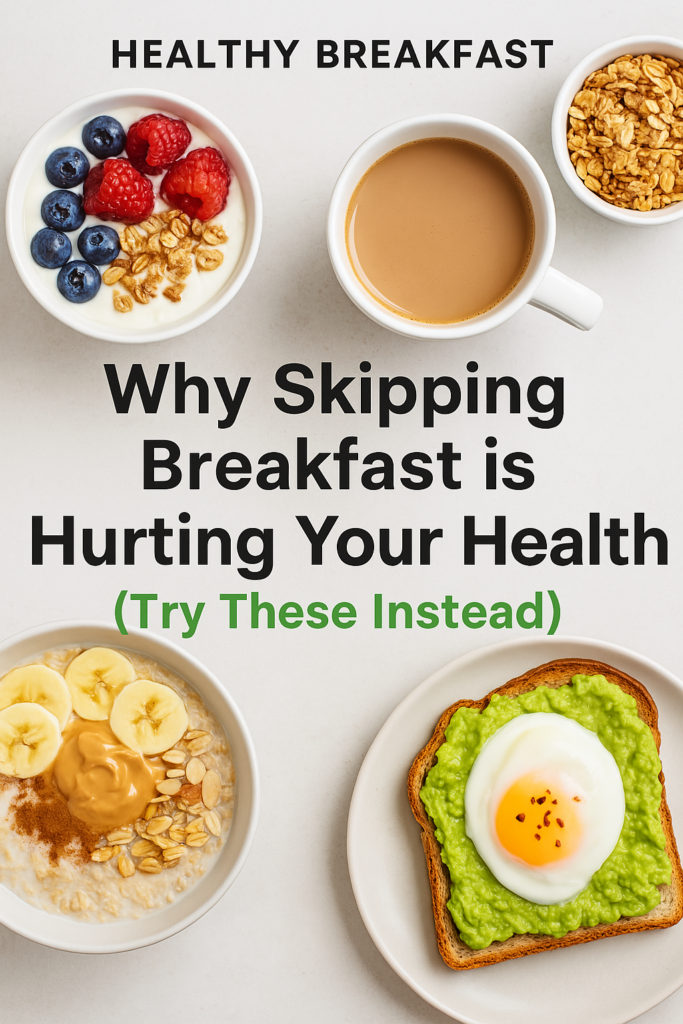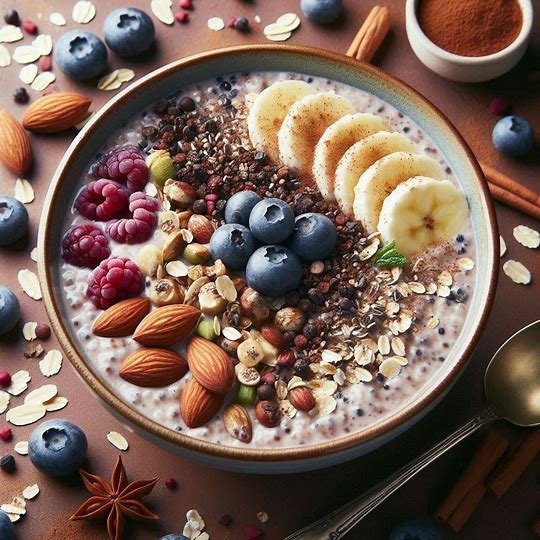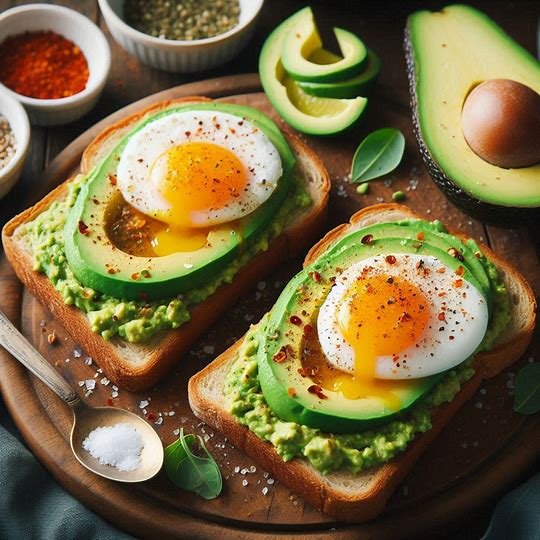
A healthy breakfast is one of the simplest yet most powerful ways to support your energy, metabolism, and overall well-being—but it’s also the meal most often skipped.
Whether you’re rushing out the door, trying to cut calories, or simply not feeling hungry in the morning, missing your morning meal can set off a chain reaction that affects your entire day.
From unstable blood sugar and low energy to intense cravings and poor concentration, skipping breakfast doesn’t just leave your stomach empty—it leaves your body and brain under-fueled.
In this post, we’ll explore exactly why skipping breakfast is harmful, and more importantly, what you can eat instead to build a satisfying, energizing, and healthy breakfast routine that works with your lifestyle.
Why Skipping Breakfast Is Bad for Your Health
Skipping breakfast doesn’t just leave you feeling sluggish—it may also lead to long-term health issues. Here’s how:
1. Disrupts Your Blood Sugar Levels
Your blood sugar is one of the most critical indicators of your energy, mood, and long-term health. When you skip a healthy breakfast, you throw off your body’s natural rhythm, making it harder to maintain steady glucose levels throughout the day.
Let’s break down exactly how that happens:
🕗 Morning Fasting Extends Too Long
After a night of sleep, your body wakes up in a fasted state.
This is the ideal time to gently raise blood sugar with a healthy breakfast that includes complex carbohydrates, protein, and healthy fats.
When you skip breakfast, you’re extending your fast even further, which can cause your blood sugar to dip too low—leading to fatigue, dizziness, and brain fog.
⚡ Midday Blood Sugar Spikes
Once you finally eat—often a high-carb or sugar-heavy lunch—your body reacts with a sharp spike in blood sugar.
This quick surge of energy feels good temporarily, but it’s usually followed by a crash that leaves you craving more sugar or caffeine.
If this becomes a daily pattern, it can increase your risk of insulin resistance and metabolic issues.
Tip: A balanced, healthy breakfast prevents these extreme highs and lows by providing steady energy from the moment you wake up.
🍭 Increased Cravings and Poor Food Choices
When your blood sugar fluctuates due to skipping breakfast, your body naturally craves quick energy.
That means you’re more likely to reach for sugary snacks, processed foods, or oversized portions later in the day.
These choices can lead to weight gain, inflammation, and further instability in your blood sugar levels.
🩺 Long-Term Health Risks
Consistently skipping a healthy breakfast and allowing blood sugar to rise and fall erratically can increase your risk for serious conditions like:
- Type 2 diabetes
- Heart disease
- Metabolic syndrome
- Hormonal imbalances
Multiple studies have linked breakfast skipping to poor glycemic control, particularly in women and people with insulin sensitivity.
What You Should Do Instead
Eating a healthy breakfast helps to anchor your blood sugar early in the day. Aim for a combination of:
- Complex carbs (like oats, whole grains, or sweet potatoes)
- Protein (like eggs, Greek yogurt, or tofu)
- Healthy fats (like avocado, nuts, or chia seeds)
- Fiber (from fruits, veggies, or seeds)
These nutrients work together to give you a gradual energy boost, keeping you full and focused for hours.
2. Leads to Overeating Later

One of the most overlooked consequences of skipping a healthy breakfast is how it impacts your hunger patterns later in the day.
While it may seem like you’re saving calories by skipping a meal, the truth is, it often leads to eating more overall—especially the wrong kinds of foods.
😫 Midday Hunger Hits Hard
By the time lunch rolls around, your hunger hormones—especially ghrelin—are in overdrive.
This can lead to overeating at lunch or grabbing quick, high-calorie snacks that lack nutritional value.
Instead of eating a planned, balanced meal, you’re more likely to binge on anything that’s fast and filling.
Fact: People who eat a healthy breakfast tend to consume fewer calories throughout the day because their appetite is better regulated.
🍕 Cravings for High-Fat, High-Sugar Foods
When your body goes too long without nourishment, it starts craving instant energy, often in the form of sugary or fatty foods.
This is your body’s way of trying to correct a low blood sugar dip—but these quick fixes only spike your blood sugar again and leave you hungry shortly after.
🔄 Disrupts Natural Eating Rhythms
Skipping a healthy breakfast throws off your natural circadian rhythm and appetite signals.
Over time, this can lead to erratic eating habits, late-night snacking, and even weight gain.
A nourishing breakfast sets the tone for a balanced day of mindful eating.
3. Slows Down Your Metabolism
If you’re trying to boost your energy or lose weight, skipping breakfast might seem like an easy calorie cut—but it often backfires.
A healthy breakfast can actually support a faster, more efficient metabolism.
🔥 Your Body Needs Fuel to Burn Fuel
Think of your metabolism like a fire.
If you don’t add fuel (food), the fire burns slower.
Eating a healthy breakfast signals to your body that it’s time to start burning calories and producing energy for the day ahead.
Tip: A breakfast with protein and fiber—like eggs with veggies or a smoothie with chia seeds—can help keep your metabolism humming.
⚠️ Skipping Breakfast Puts Your Body in “Conservation Mode”
When you consistently skip meals, your body can interpret it as a form of stress or scarcity.
In response, it starts holding on to fat reserves and slows down calorie burn to conserve energy.
This is especially counterproductive if you’re aiming for fat loss or improved body composition.
🧬 Hormonal Impact on Metabolism
A healthy breakfast helps regulate hormones like cortisol and insulin.
These hormones play a major role in fat storage, hunger, and energy production.
When they’re out of balance—due to inconsistent meals—your metabolism suffers.
4. Negatively Affects Cognitive Performance

Your brain, just like your body, needs fuel to function.
Skipping a healthy breakfast can significantly impair your ability to concentrate, remember, and stay mentally sharp—especially in the morning when you need to be most alert.
🧠 The Brain Runs on Glucose
Glucose is your brain’s primary source of energy.
After fasting overnight, your brain depends on breakfast to restore optimal glucose levels.
A lack of a healthy breakfast can make you feel foggy, distracted, or mentally sluggish.
Did you know? Students and professionals who eat a balanced breakfast tend to perform better on tests and tasks that require focus and memory.
😵 Increased Brain Fog and Fatigue
Without a steady supply of nutrients in the morning, you’re more likely to experience brain fog, slower reaction times, and poor decision-making.
This can affect everything from your productivity at work to your emotional regulation.
☕ Relying on Caffeine Isn’t the Same
Many people substitute breakfast with coffee, thinking it’s enough to get them going.
But caffeine without food can spike cortisol, increasing stress and further draining your energy reserves.
Pairing coffee with a healthy breakfast balances your blood sugar and provides long-lasting energy.
✅ The Benefits of a Healthy Breakfast
Starting your day with a healthy breakfast isn’t just about curbing hunger—it’s about fueling your body and mind for optimal performance.
From energy levels to metabolism, the benefits are far-reaching and backed by both science and everyday experience.
Let’s break down what a healthy breakfast actually does for you:
⚡ 1. Boosts Energy and Mood
When you wake up, your body is in need of replenishment.
A healthy breakfast provides the energy needed to shift your body from rest to action.
- Complex carbs from oats, fruit, or whole grains offer sustained energy.
- Protein helps stabilize blood sugar and keeps you full.
- Healthy fats support brain function and hormonal balance.
Starting your day with balanced nutrition can significantly improve your mood, lower stress, and prevent the crankiness that comes from low blood sugar.
🎯 2. Improves Focus and Productivity

A healthy breakfast gives your brain the fuel it needs to concentrate, solve problems, and stay sharp.
Skipping breakfast has been linked to poorer memory, reduced attention span, and slower cognitive processing.
- Students and working professionals alike perform better on tasks when they eat breakfast.
- Nutrients like omega-3s, B vitamins, and antioxidants (from nuts, eggs, and fruits) support cognitive health.
⚖️ 3. Supports Weight Management
Contrary to the belief that skipping breakfast helps with weight loss, studies show that people who regularly eat a healthy breakfast are more likely to maintain a healthy weight.
Here’s why:
- It prevents overeating later in the day.
- It curbs cravings for processed snacks and sugar.
- It boosts metabolism by “waking up” the digestive system.
Consistency is key—your body thrives on predictable, balanced nourishment.
🔁 4. Balances Hormones and Reduces Cravings
When you eat a healthy breakfast, you help regulate hormones like insulin, cortisol, and ghrelin (your hunger hormone).
Balanced hormones = balanced appetite.
- A protein-rich breakfast can help reduce levels of ghrelin, so you stay full longer.
- High-fiber foods keep your digestion regular and improve hormone detoxification.
🔥 5. Strengthens Metabolism and Digestion
Eating a healthy breakfast early in the day kickstarts your metabolism and activates enzymes that help your body digest and absorb nutrients more efficiently.
- Starting digestion early means your body processes meals better throughout the day.
- It also trains your body to maintain a regular eating pattern, which is great for long-term metabolic health.
🌟 Bonus Benefit: It Sets a Healthy Tone for the Day
Making the choice to nourish yourself first thing in the morning often leads to better decisions all day long.
When you start with a healthy breakfast, you’re more likely to:
- Pack a balanced lunch
- Skip sugary snacks
- Drink more water
- Prioritize movement and wellness
It’s not just a meal—it’s a mindset.
🥣 What to Eat Instead: Try These Healthy Breakfast Ideas
Now that we’ve uncovered the downsides of skipping breakfast, let’s shift to the fun part—what you should eat instead.
A healthy breakfast doesn’t need to be complicated or time-consuming.
With a little intention and a few go-to ideas, you can build a breakfast routine that’s nourishing, energizing, and actually enjoyable.
Here are some easy, balanced, and delicious healthy breakfast options that work for busy mornings, meal prep, or slow weekends.
🍓 1. Greek Yogurt Parfait

A parfait made with plain Greek yogurt is one of the fastest ways to pack in protein, probiotics, and fiber.
Ingredients:
- 1 cup unsweetened Greek yogurt
- ½ cup fresh berries (blueberries, strawberries, or raspberries)
- ¼ cup granola or rolled oats
- 1 tsp chia seeds or flaxseeds
- Drizzle of raw honey or maple syrup (optional)
Why it’s a healthy breakfast:
Greek yogurt is rich in protein and gut-friendly probiotics. Pairing it with fiber-rich berries and healthy fats from seeds helps keep you full and supports digestion.
Prep tip: Layer it in a mason jar the night before for a grab-and-go option.
🥣 2. Overnight Oats

Overnight oats are a no-cook, make-ahead healthy breakfast that’s endlessly customizable.
Base Recipe:
- ½ cup rolled oats
- ½ cup milk or plant-based milk
- 1 tbsp nut butter (like almond or peanut)
- ½ banana, mashed
- Dash of cinnamon
Add-ins: Berries, cacao nibs, protein powder, chia seeds, coconut flakes
Why it’s a healthy breakfast:
Oats are full of soluble fiber, which supports heart health and keeps you satisfied. Adding protein and healthy fats ensures a balanced meal that won’t spike your blood sugar.
Prep tip: Make a batch for 3–4 days and store in the fridge.
🍳 3. Avocado Toast with Egg

This trendy classic is popular for a reason—it’s quick, customizable, and a complete healthy breakfast.
How to make it:
- 1 slice sprouted or whole grain bread, toasted
- ½ avocado, mashed
- 1 poached or fried egg (or scrambled, if you prefer)
- Sprinkle of chili flakes, sea salt, or everything bagel seasoning
Why it’s a healthy breakfast:
Avocados provide heart-healthy monounsaturated fats and potassium, while eggs deliver high-quality protein and essential vitamins like B12 and D.
Upgrade it: Add spinach, cherry tomatoes, or smoked salmon for extra nutrients.
🍌 4. Smoothie Bowl

A smoothie bowl is like a regular smoothie—but thicker, spoonable, and packed with texture from delicious toppings.
Blend:
- 1 frozen banana
- ½ cup frozen berries
- ½ cup spinach or kale
- ½ cup unsweetened almond milk
- Scoop of protein powder or Greek yogurt
Top with: Sliced fruit, granola, hemp seeds, shredded coconut
Why it’s a healthy breakfast:
Smoothie bowls are loaded with antioxidants, fiber, and vitamins. Adding toppings with healthy fat and crunch also improves satiety and digestion.
Prep tip: Freeze smoothie packs with fruit and greens for quick blending in the morning.
🧁 5. Veggie-Packed Egg Muffins

These are like mini frittatas—perfect for meal prep and portable healthy breakfasts.
Ingredients:
- 6–8 eggs
- Diced bell peppers, spinach, tomatoes, onions
- Salt, pepper, and herbs to taste
- Optional: shredded cheese or cooked turkey sausage
Instructions: Whisk everything together, pour into a greased muffin tin, and bake at 375°F (190°C) for 20–25 minutes.
Why it’s a healthy breakfast:
Packed with protein and vegetables, egg muffins are low in carbs, high in nutrients, and easy to grab on your way out the door.
Storage tip: Keep in the fridge for 4–5 days or freeze in batches.
🌿 Pro Tips for Building the Perfect Healthy Breakfast
Want to make your healthy breakfast even better? Here’s how:
- Aim for the “Big 3”: Include protein, fiber, and healthy fats.
- Minimize sugar: Choose natural sweeteners like fruit or honey in small amounts.
- Stay hydrated: Drink a glass of water or lemon water before or with breakfast.
- Eat mindfully: Even five minutes of intentional eating can reduce stress and improve digestion.
🧭 How to Build a Healthy Breakfast Routine
Building a healthy breakfast routine doesn’t have to mean waking up an hour earlier or becoming a gourmet chef.
With a few smart habits and a bit of planning, you can turn breakfast into one of the most nourishing and consistent parts of your day.
Here’s how to make your healthy breakfast routine stick—for good.
📝 1. Plan Ahead to Save Time
The biggest reason most people skip breakfast is lack of time.
But a little planning can go a long way.
Actionable tips:
- Prep overnight oats, chia pudding, or smoothie packs the night before.
- Batch-cook egg muffins or breakfast burritos and freeze them for the week.
- Set out ingredients, utensils, or containers in the evening so your morning is streamlined.
Healthy breakfast hack: Make a weekly breakfast menu with 2–3 go-to meals. Simplicity breeds consistency.
🌅 2. Start Small (Especially if You’re Not a Morning Eater)
If you’re not hungry in the morning, start with something light and build from there.
Gentle starts:
- A smoothie or a small bowl of yogurt and fruit
- A hard-boiled egg with half a banana
- A slice of whole grain toast with almond butter
Over time, your body will adjust to receiving morning fuel, and you’ll begin to crave your healthy breakfast.
💧 3. Hydrate First, Eat Second

Drinking water before eating helps wake up your digestive system and jumpstarts metabolism.
Hydration ideas:
- Warm lemon water
- Herbal tea
- Coconut water or water infused with cucumber or mint
Pro tip: Dehydration often feels like hunger. Starting your day with water ensures you’re giving your body what it truly needs.
⚖️ 4. Prioritize Balance Over Perfection
A good healthy breakfast doesn’t have to be fancy—it just needs to be balanced.
Aim for these nutrients:
- Protein: eggs, Greek yogurt, protein powder, tofu
- Fiber: oats, whole grains, chia seeds, fruits, veggies
- Healthy fats: avocado, nut butters, seeds, olive oil
- Complex carbs: sweet potatoes, whole-grain bread, berries
Even a simple combo—like a boiled egg, fruit, and a slice of toast—can offer lasting energy and satiety.
⏰ 5. Make It Part of Your Morning Ritual
Pair your healthy breakfast with something you enjoy to create a positive morning ritual.
Ideas:
- Eat while journaling, reading, or enjoying your coffee in peace.
- Sit outside or by a sunny window for natural light and calm.
- Listen to music or a short podcast to start your day inspired.
The more enjoyable your routine, the more likely it is to stick.
📆 Bonus Tip: Be Consistent
Routine builds habit. Try eating your healthy breakfast at the same time every day—even on weekends.
This consistency trains your hunger cues, improves digestion, and supports a stronger metabolism.
Don’t Skip—Swap!
If there’s one thing to take away from this, it’s that skipping breakfast isn’t doing your body—or your goals—any favors.
But this isn’t about guilt or restriction. It’s about swapping a harmful habit for a supportive one.
Instead of skipping breakfast altogether, swap it for a healthy breakfast that fuels your energy, sharpens your focus, and supports long-term health.
🛑 Why Skipping Isn’t the Answer
Skipping breakfast might feel like a time-saver or calorie-cutter, but it often leads to:
- Energy crashes
- Overeating later in the day
- Slowed metabolism
- Poor concentration
- Increased cravings
None of these support your health, productivity, or well-being.
That’s why the solution isn’t to skip—it’s to upgrade your morning with a simple, healthy breakfast.
✅ Make the Shift Today
You don’t need to overhaul your entire routine to feel better—you just need to start with one meal.
Tomorrow morning, try one of the easy healthy breakfast options we’ve covered, or prep something tonight to make your morning stress-free.
Need inspiration?
Here are a few quick swaps you can try:
| Instead of… | Try this Healthy Breakfast… |
|---|---|
| Skipping breakfast entirely | Overnight oats with berries and almond butter |
| Grabbing a sugary pastry | Greek yogurt with fruit and granola |
| Just coffee | Smoothie with banana, spinach, and protein powder |
| White toast with jam | Avocado toast with a poached egg |
Remember: A healthy breakfast is not about perfection—it’s about progress. Small, consistent changes lead to long-term results.
🌿 Ready to Level Up Your Mornings?
Start by choosing one breakfast idea and stick with it for the next 3–5 days.
Notice how you feel—more energized, more focused, and less likely to crash midday.
Need more breakfast ideas, meal plans, or time-saving tips?
👉 10 Quick & Easy Healthy Breakfast Recipes for Busy Mornings
📚 References
- Harvard T.H. Chan School of Public Health.
“The Nutrition Source: Breakfast.”
https://www.hsph.harvard.edu/nutritionsource/healthy-eating-plate/breakfast/ - U.S. National Library of Medicine – National Institutes of Health.
Jakubowicz, D. et al. (2013). “High Caloric Intake at Breakfast vs. Dinner Differentially Influences Weight Loss of Overweight and Obese Women.”
Obesity (Silver Spring)
https://www.ncbi.nlm.nih.gov/pmc/articles/PMC3958955/ - American Heart Association.
“Skipping Breakfast May Increase Heart Disease Risk.”
https://www.heart.org/en/news/2017/08/02/skipping-breakfast-may-increase-heart-disease-risk - Mayo Clinic.
“Intermittent fasting: What are the benefits?”
https://www.mayoclinic.org/healthy-lifestyle/nutrition-and-healthy-eating/expert-answers/intermittent-fasting/faq-20441303 - International Journal of Obesity.
Farshchi, H. et al. (2005). “Deleterious effects of omitting breakfast on insulin sensitivity and fasting lipid profiles in healthy lean women.”
https://www.nature.com/articles/0802895
